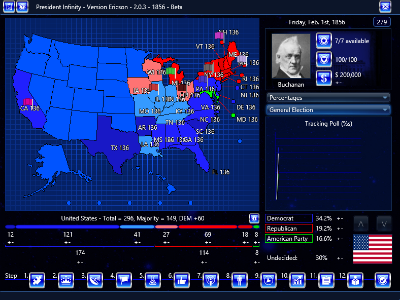*This scenario was updated greatly by the Historical Scenario Commission on July 27, 2017. Version 2.0 can be downloaded here: United States – 1856 v. 2.0
This election takes place amid violence between pro-slavery supporters and abolitionists in Kansas. The slavery questions and sectionalism threaten to tear the country apart. However, the Democratic Party, despite threatening to split apart, has the luxury of campaigning against two weaker parties, despite a poor first term by incumbent president Franklin Pierce. A new party, the Republicans are quickly emerging as the opposition party, with former Conscious Whigs, Free Soil Democrats and Northern abolitionists joining together. The majority of Whigs, and Cotton Whigs that do not join the Democrats, unify around the American (or Know Nothing) Party, which aims at preserving the Union and keeping Catholic Immigrants, such as the Irish, Italians and Southern Germans, out of the country. While a rising party during the mid-terms, their anti-immigrant stance is hurting their reputation, causing many of their numbers to join the Republicans, which started out as a single-issue anti-slavery 3rd party during the midterms.
For Republicans, the primary leaders of the party have decided to sit the first election out, perhaps because the election looks like a lost cost. As such, they unify behind the celebrated explorer John C. Fremont, known as “The Great Pathfinder.” His only challenger is former Jacksonian Democrat, and now moderate Republican, Supreme Court Justice John McLean.
The Democrats have 4 major candidates running for the election. Ambassador and former Secretary of State, James Buchanan, who nearly won in 1852, is the front runner against incumbent president Franklin Pierce, who appears to be a defeated president. Stephen A. Douglas, the advocate of Popular Sovereignty, hopes to win over voters in the West and North to secure the election. Lewis Cass, the leader of the expansionists, while a former nominee, may be past his prime.
The American/Know Nothing Party fields former Whig president Millard Fillmore and anti-immigrant businessman George Law. Fillmore hopes that his historic signing of the Great Compromise of 1850 will unify the country behind a compromise candidate.
This election allows for many what-if scenarios:
- What if other leading Republicans aimed for the nomination? These include Republican leader William H. Seward, former US Rep Abraham Lincoln, Speaker Nathaniel P. Banks, abolitionist Charles Sumner.
- What if Jefferson Davis ran as a Southern option for president and William L. Marcy ran as an option from electoral-vote-heavy New York state?
- What if The Liberty Party ran a candidate in 1856 [Note: left this party more as a way to simulate an election without selecting a competing party.]
Feedback is desired.


Nice scenario! Fremont was ahead of his time in real life, hope to get him elected here at least
Yeah, I’m curious as to how he would have been as a president, though. That is, outside of a good platform.
North American – Nathaniel P. Banks
North American Seceders – Robert F. Stockton
Both declined to run, endorsing Fremont and Fillmore, respectively.
For the Democrats, one speculative candidate I have is John C. Fremont. He was courted by the Dems before he went with his conscience and became a Republican. Potential VPs include John A. Quitman and Linn Boyd.